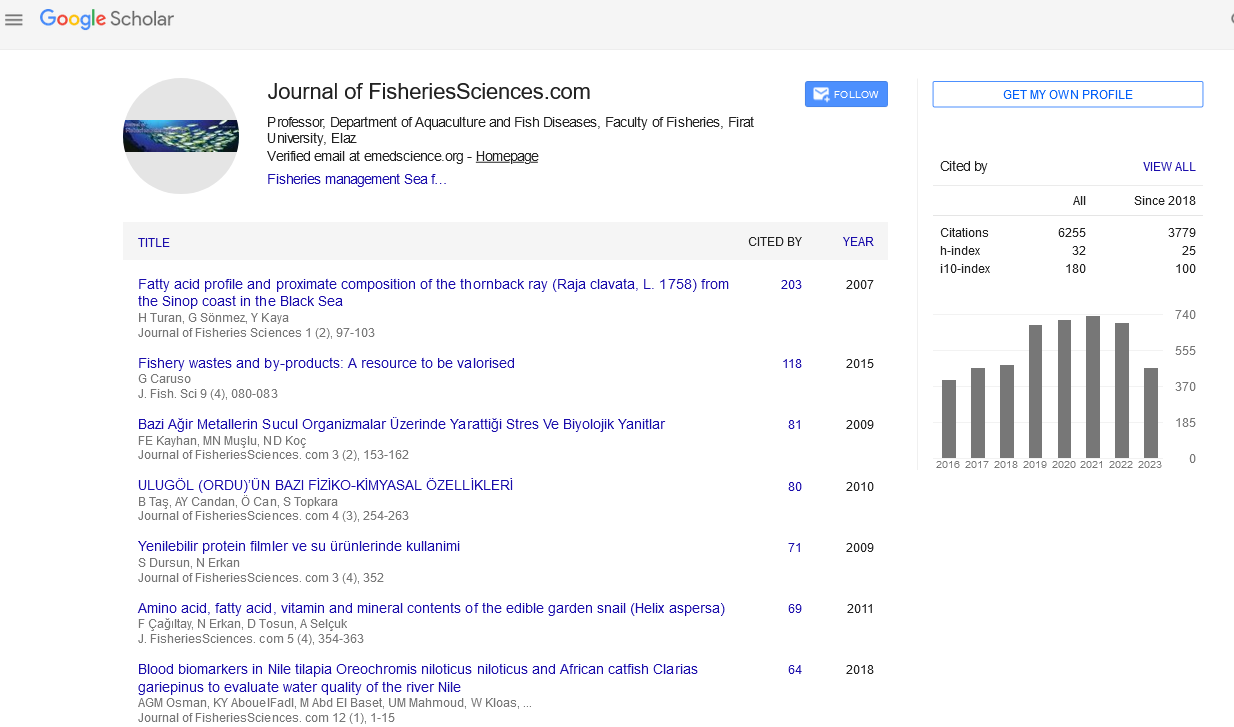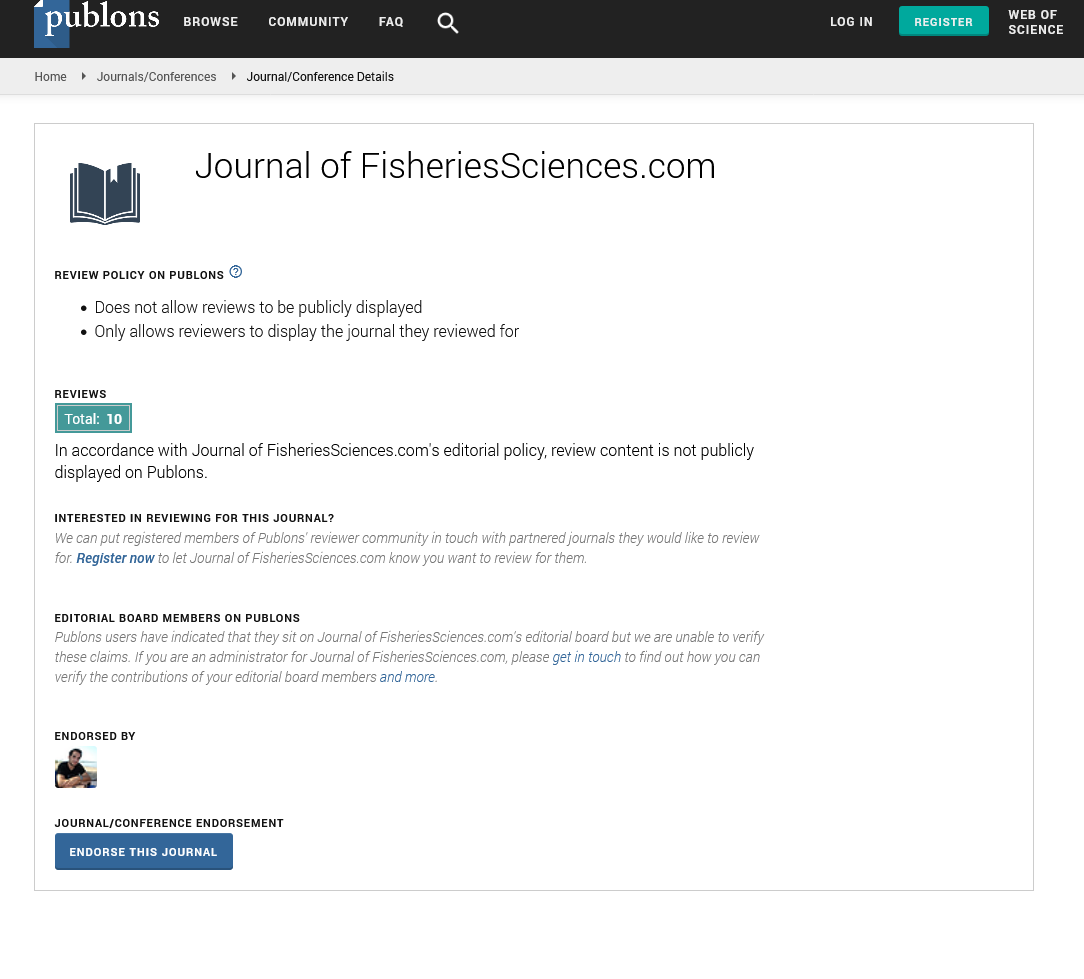Perspective - (2024) Volume 18, Issue 1
Exploring the Depths: The Fascinating World of Marine Biology
Brandon Klein*
Department of Biology, Ball State University, Muncie, USA
*Correspondence:
Brandon Klein, Department of Biology, Ball State University, Muncie,
USA,
Email:
Received: 04-Jan-2024, Manuscript No. IPFS-24-14501;
Editor assigned: 08-Jan-2024, Pre QC No. IPFS-24-14501 (PQ);
Reviewed: 22-Jan-2024, QC No. IPFS-24-14501;
Revised: 29-Jan-2024, Manuscript No. IPFS-24-14501 (R);
Published:
06-Feb-2024
Introduction
Marine biology, the scientific study of marine life,
encompasses a vast and diverse realm teeming with fascinating
organisms and intricate ecosystems. This field of biology delves
into the mysteries of the world's oceans, seas, and other bodies
of saltwater, providing insights into the complex relationships
that govern life beneath the waves. In this article, we will
explore the importance of marine biology, the diverse
ecosystems it investigates, the incredible adaptations of marine
organisms, and the conservation challenges facing our oceans.
Marine biology plays a pivotal role in understanding the
health of our planet. Oceans cover over 70% of the Earth's
surface and are essential for maintaining ecological balance and
supporting life. Studying marine biology allows scientists to
unravel the interconnected web of life in aquatic environments,
helping us comprehend the roles of marine organisms in
nutrient cycling, climate regulation, and oxygen production.
Description
Diverse marine ecosystems
Marine ecosystems are incredibly diverse, ranging from the
sunlit surface waters to the deepest, darkest trenches. Coral
reefs, often referred to as the rain forests of the sea, are among
the most biologically rich ecosystems. These vibrant and
intricate structures provide habitat for a staggering array of
marine life, from colorful fish to microscopic algae. Other
ecosystems, such as kelp forests, seagrass beds, and estuaries,
each harbor unique communities of organisms adapted to their
specific environmental conditions.
Deep-sea environments, although challenging to study due to
their inaccessibility, reveal a multitude of mysterious and awe-inspiring
creatures. From bioluminescent organisms that light up
the abyss to colossal creatures like the giant squid, the deep sea
remains one of the least-explored frontiers on Earth. Marine
biologists use cutting-edge technology such as Remotely
Operated Vehicles (ROVs) and submersibles to unveil the secrets
hidden in these extreme environments.
Adaptations of marine organisms
Marine organisms have evolved an astounding array of
adaptations to thrive in diverse and often harsh environments.
One remarkable example is the ability of certain fish species,
such as the anglerfish, to generate light through bioluminescence.
This adaptation serves various purposes, including attracting prey
or mates in the pitch-black depths.
The incredible diversity of body shapes and sizes among
marine organisms reflects the challenges posed by different
ecological niches. From the streamlined bodies of dolphins,
optimized for swift swimming, to the camouflaging abilities of
octopuses and cuttlefish, marine life has developed an
impressive repertoire of survival strategies. The study of these
adaptations not only enhances our understanding of marine
biology but also inspires innovations in fields like bioengineering
and materials science.
Conservation challenges and marine biology
Despite the marvels of marine life, our oceans face
unprecedented threats from human activities. Overfishing,
pollution, climate change, and habitat destruction are
jeopardizing the health of marine ecosystems. Marine biologists
are at the forefront of conservation efforts, working to
understand and mitigate these impacts.
Coral bleaching, a consequence of rising sea temperatures
associated with climate change, poses a significant threat to
coral reefs worldwide. Understanding the complex interactions
between corals and their symbiotic algae is crucial for
developing strategies to protect these vital ecosystems.
Additionally, marine biologists contribute to the design of marine
protected areas and advocate for sustainable fishing
practices to preserve biodiversity and restore degraded habitats.
The study of marine biology also extends to the impact of
pollutants on marine ecosystems. Plastic pollution, in particular,
poses a severe threat to marine life, with millions of tons of
plastic entering the oceans each year. Marine biologists
investigate the effects of plastics on marine organisms and
ecosystems, providing valuable insights for policymakers and
conservationists working towards reducing plastic pollution.
Conclusion
Marine biology offers a captivating journey into the heart of
Earth's oceans, unlocking the mysteries of underwater life and
ecosystems. As our understanding of marine biology deepens, so
does our responsibility to protect and conserve these vital
environments. By addressing conservation challenges, promoting
sustainable practices, and fostering a global commitment to ocean health, marine biologists contribute not only to scientific
knowledge but also to the preservation of a diverse and
interconnected world beneath the waves. The ongoing exploration
of marine biology holds the promise of revealing new wonders
and inspiring a collective effort to ensure the continued vitality
of our oceans.
Citation: Klein B (2024) Exploring the Depths: The Fascinating World of Marine Biology. J Fish Sci Vol:18 No:1






